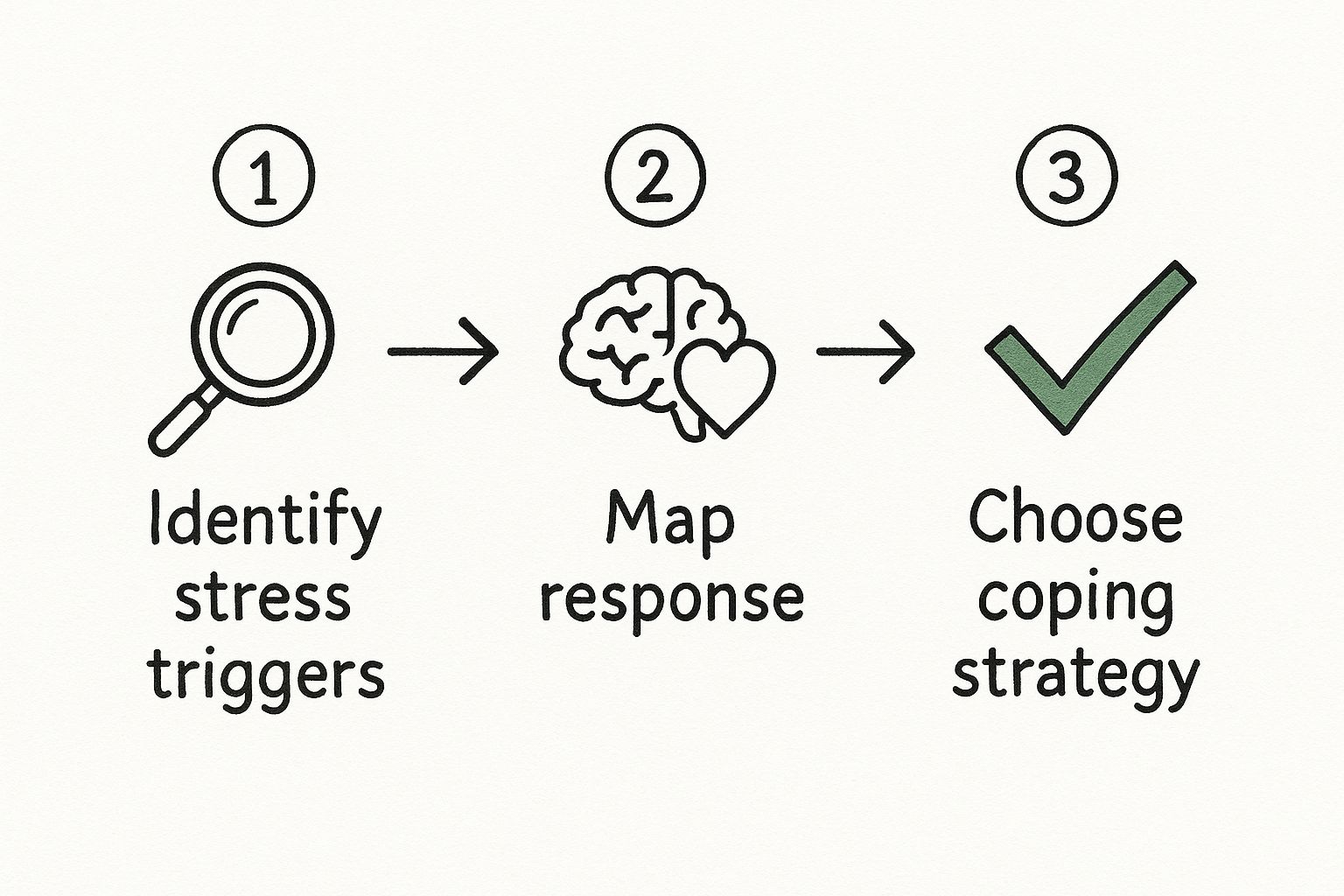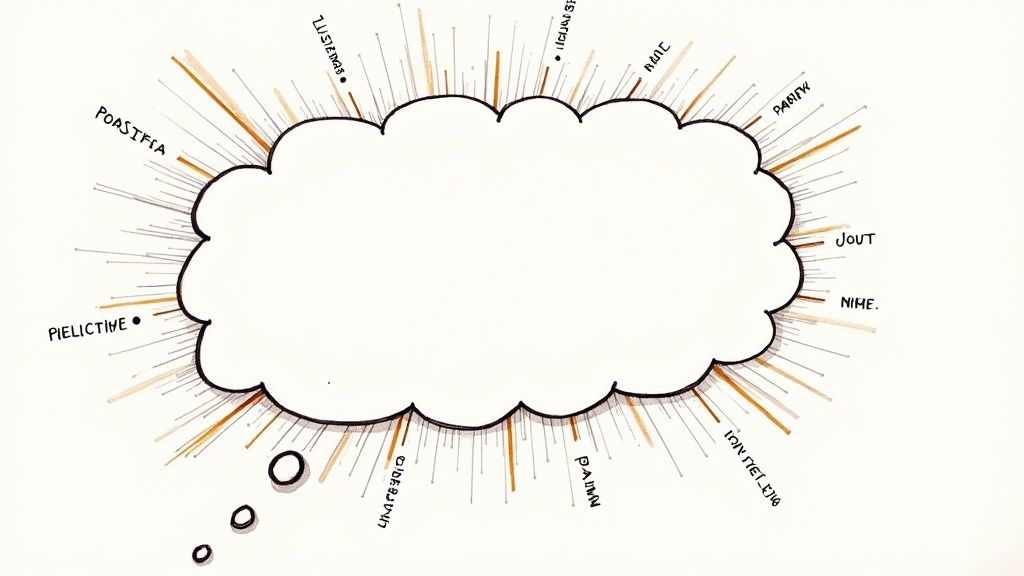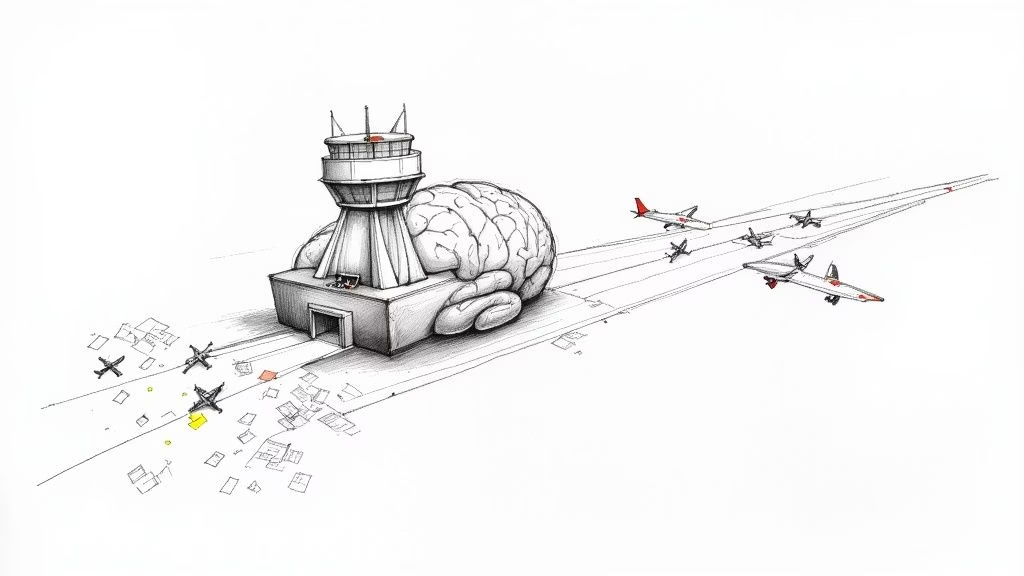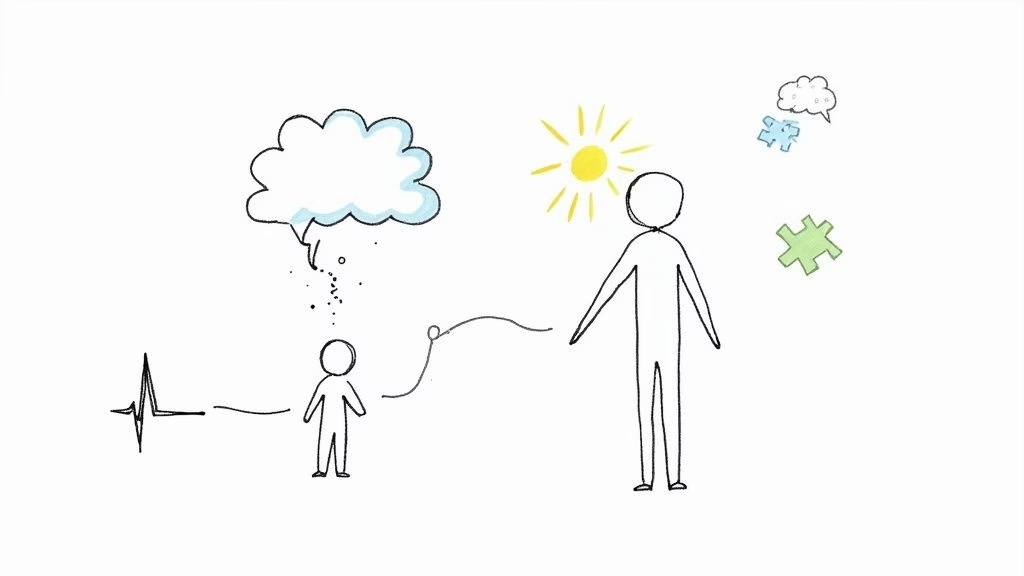Think of mental resilience as a muscle for your mind. It’s not about avoiding challenges or pretending you're tough all the time. It's about developing the inner strength to bounce back when life knocks you down, whether it's from exam stress, a tough social situation, or a major setback.
Instead of seeing obstacles as dead ends, resilience helps you turn them into opportunities to get stronger. It’s a skill you can actually train.
What Is Mental Resilience and Why Does It Matter?

Just like lifting weights builds physical strength, facing and overcoming difficulties builds your mental fortitude. It’s the ability to adapt to adversity and stress without letting it completely derail you.
This skill is absolutely essential in a world filled with academic pressure, endless social media comparisons, and a whole lot of uncertainty about the future.
Resilience is what allows you to see a failed test not as a final judgment on your intelligence, but as a sign you need a new study strategy. It's that quiet inner voice that encourages you to try again after feeling rejected or left out.
The Growing Need for Resilience
This isn't just a "nice-to-have" skill—it's becoming a necessity. With mental health conditions affecting more than 1 billion people worldwide, learning how to cope is more important than ever. The World Health Organization points to conditions like anxiety and depression as leading causes of long-term disability, which shows just how critical it is to build these skills early on.
This is about more than just surviving hard times; it's about learning how to thrive through them. Resilience gives you the power to manage your thoughts, regulate your emotions, and hold onto a sense of control when things feel chaotic.
By building mental resilience, you're creating a personal toolkit for navigating life’s ups and downs with more confidence and less stress. It shifts your focus from the size of the problem to your ability to handle it.
Resilience in Your Future
Developing this strength now pays off big time in the long run. It's not just for school—it's one of the soft skills crucial for leadership, such as mental resilience that colleges and employers are actively looking for. They want people who can adapt to change and stick with it when things get tough.
So, what goes into building this mental muscle? It's not just one thing, but a combination of several key pillars that strengthen your inner core.
Below is a quick look at the core components we'll be exploring. Think of these as the foundation you'll build your resilience on.
Key Pillars of Mental Resilience
| Pillar | What It Means for You | Quick Example |
|---|---|---|
| Self-Awareness | Understanding your own thoughts, feelings, and reactions. | Noticing that you get irritable when you're stressed about homework. |
| Mindfulness | Staying grounded in the present moment. | Taking five deep breaths before a big presentation instead of worrying. |
| Connection | Building a strong support system of friends and family. | Calling a friend to talk through a problem instead of bottling it up. |
| Purpose | Having a sense of meaning that guides your actions. | Volunteering for a cause you care about to feel connected to something bigger. |
Each of these pillars plays a unique role in creating a stronger, more adaptable mindset. By working on them, you're not just preparing for the next challenge—you're preparing for whatever lies ahead in life.
Build Your Foundation for a Resilient Mind
Building real mental resilience isn't about some grand, overnight transformation. It’s about the small, consistent habits you build day in and day out. Think of it like laying bricks for a house—each small choice creates a stronger foundation. Your mental and physical well-being are deeply connected, and honestly, one of the best ways to fortify your mind is to take care of your body.
It all starts with a mindset shift. Stop seeing daily choices like sleep, food, and movement as chores. Instead, see them as direct investments in your mental strength. Small, sustainable changes in these areas add up to a massive difference in how you handle stress. This isn't about being perfect; it's about creating a routine that actually supports you.

This image really nails it: resilience starts with awareness. It's about recognizing your triggers, understanding your knee-jerk reactions, and then consciously choosing a healthier way to cope.
Small Changes with Big Impact
Let's get practical. Here are a few ways you can start building this foundation right now. These aren't generic tips you'll forget in five minutes—they're actionable steps designed for real life, especially when you're juggling school, friends, and figuring out your future.
-
Prioritize Sleep (Realistically): Aiming for eight hours can feel impossible. Instead, just focus on a simple "wind-down" routine. Try putting your phone away 30 minutes before bed. That small act signals to your brain that it's time to rest, which can seriously improve your sleep quality and your ability to manage emotions the next day.
-
Fuel Your Brain: What you eat directly impacts your mood and focus. You don’t need a perfect diet. Just try to add one brain-boosting food to your day—like a handful of nuts, some berries, or leafy greens. Doing this consistently is way more powerful than trying to be "healthy" for one random day.
-
Find Movement You Actually Enjoy: Forget forcing yourself to do workouts you hate. Resilience gets a boost from activities that genuinely reduce your stress. This could be a walk while listening to music, shooting hoops, or a quick yoga session on YouTube. The goal is joyful movement, not self-punishment.
These habits are more than just nice-to-haves. With mental health disorders affecting approximately 22.8% of adults in the US alone, building resilience through a healthy lifestyle is one of the most proactive things you can do for yourself.
Building Self-Awareness Through Action
Here's the cool part: these daily actions do more than just support your physical health. They're a direct path to greater self-awareness.
When you start noticing how a good night's sleep affects your patience or how certain foods tank your energy, you're practicing mindfulness without even trying. You begin to understand your own patterns and triggers. This is the bedrock of learning to manage your stress responses instead of letting them manage you.
If you're interested in going deeper, our guide on how to improve self-awareness is a great next step.
The foundation of resilience is built brick by brick with daily choices. Each time you choose a healthy habit, you're casting a vote for a stronger, more capable version of yourself.
Tackle School Stress and Procrastination

School pressure is no joke. I’ve seen it a thousand times: the mountain of assignments, the deadlines closing in, and the overwhelming urge to do literally anything else. It's a vicious cycle.
When you're stuck in that procrastination loop, it’s easy to beat yourself up and think you're lazy or unmotivated. But here’s the truth: it’s rarely about that.
Procrastination is often just your brain’s way of hitting the brakes to avoid stress. It’s a defense mechanism against the anxiety, boredom, or self-doubt that a big project can stir up. Once you get that, you can start building the mental muscle to push through it.
Practical Steps to Break the Cycle
Forget about waiting for some magical burst of motivation to strike. It won't. Instead, you can use a few simple, concrete tricks to get yourself moving. The whole idea is to make starting so ridiculously easy that your brain doesn't have time to protest.
- The Two-Minute Rule: Find one tiny piece of a task you can do in less than two minutes. Seriously, that small. Open your textbook. Write one sentence. Create a new Google Doc for your essay. The momentum you get from that one tiny action is often enough to make the next step feel possible.
- Chunk It Down: Staring at a ten-page research paper is terrifying. But finding one good source? You can do that. Break your huge projects down into tiny, non-threatening steps. Your only job is to tackle the next small chunk, not the entire monster at once.
If you find yourself putting things off all the time, it's worth digging into the "why" behind it. Learning how to stop procrastinating is really about understanding your own triggers and building new habits from the ground up.
Procrastination isn't a character flaw; it's a response to a feeling. By making the first step ridiculously small, you lower the emotional barrier and trick your brain into starting.
Finding Motivation and Support
Lasting motivation almost never comes from outside pressure. It has to come from connecting what you have to do with what you actually care about.
Try to find a personal hook for your schoolwork. How does that boring history lesson connect to something happening in the world right now that fires you up? What skills will this math problem help you build for a career you're actually excited about?
Of course, the challenges go way beyond just schoolwork. For a deeper look at navigating all the other feelings that come up, this is a great resource on understanding emotions and coping strategies during teenage years.
For teen boys and young men who are feeling the weight of it all, it's critical to know that asking for support is a sign of strength, not weakness. Organizations like The Man Cave and Next Gen Men are creating incredible spaces and mentorship programs to help young men build emotional intelligence and resilience. They're all about challenging those old-school stereotypes and encouraging real, open conversations about mental health.
Finding a community where you can just be yourself without judgment is one of the most powerful ways to build the confidence you need to handle stress.
Don't Go It Alone: Find Your Strength in Connection
Trying to build mental strength all by yourself is a recipe for burnout. It’s like trying to spot yourself on a heavy bench press—it’s not just hard, it’s risky. I’ve learned over the years that real strength isn’t about gritting your teeth and handling everything in silence. It’s about knowing who’s in your corner and having the guts to lean on them when you need to.
Your support system is one of the most powerful tools you have. These are the people who act as your safety net, your sounding board, and the ones who remind you that you’re not the only one dealing with this stuff. When school stress is piling up or you’re just feeling isolated, they’re your lifeline.
This is a game-changer, especially for young men. We’re often fed this old-school script that says we have to "tough it out" and keep our feelings on lockdown. Let's be real: that script is broken. Reaching out isn’t a sign of weakness—it’s a sign that you’re self-aware enough to know you can’t do it all alone. That’s real strength.
How to Build a Real Support System
Your crew doesn't have to be huge. It can be a mix of friends, family, a coach you trust, or even a mentor. The goal is to find people who will listen without jumping to conclusions and who genuinely want to see you succeed.
- Spot a True Friend: Look for the friends who celebrate your wins but, more importantly, are still there when you’re in a slump. A real friend listens when you vent about a bad grade or a tough day at home; they don’t just hit you with a generic "get over it."
- Find a Trusted Adult: This could be anyone—a parent, a cool teacher, a coach, or an uncle. Getting an adult's perspective can make a world of difference when you’re stuck on a problem that feels way too big to solve on your own.
The need for these connections is more urgent than ever. We know that globally, more than one in six young people deal with mental health struggles. Things like academic pressure and just feeling disconnected are huge contributors. Building strong social connections is one of the most direct and effective ways to fight back. If you want to dive deeper, there's some great research on youth mental well-being and resilience being done.
Mental Health Resources for Teens and Young Men
Sometimes, the best support comes from people and places that are specifically designed to help with what you're going through. It’s not always easy to find the right fit, so I’ve put together a list of solid organizations that offer safe spaces to connect, learn, and get support. Many of these have a specific focus on helping young men navigate the unique pressures they face.
| Resource Name | What It Offers | Best For |
|---|---|---|
| The Jed Foundation (JED) | Provides resources and support to protect emotional health and prevent suicide for teens and young adults. | Teens looking for reliable mental health information and practical tools. |
| The Man Cave | Offers programs and mentorship to help young men develop healthy masculinity and emotional intelligence. | Young men seeking positive role models and a strong sense of community. |
| Boys & Girls Clubs of America | Provides safe spaces, mentorship, and programs focused on academic success and healthy lifestyles. | Teens needing a structured, supportive environment outside of school. |
| Next Gen Men | An organization focused on engaging boys and men in conversations about gender and building a better future. | Young men interested in leadership, social change, and positive masculinity. |
Take a look and see if any of these resonate. Finding the right resource can feel like finally talking to someone who speaks your language.
A Quick Grounding Exercise for Connection
Ever feel completely disconnected, even in a crowded room? Give this a shot.
Find a quiet spot to sit, close your eyes, and just take a few slow, deep breaths. Now, picture someone in your life who really cares about you—a friend, a parent, anyone. Imagine them sending you positive energy and support. Just sit with that feeling for a minute or two. It’s a small thing, but it can be a powerful reminder that you’re connected, even when you feel alone.
A Realistic Guide to Mindfulness and Meditation

Let's be honest, the word "meditation" probably brings up images of silent monks on a mountaintop. But it doesn't have to be that serious or complicated. At its core, it’s just training for your brain. Think of it as doing reps for your focus and calm.
Mindfulness is a huge part of this. It’s simply about paying attention to what’s happening right now, without judging it. This is a game-changer for building mental resilience because it teaches you to observe your thoughts and feelings instead of getting swept away by them. It's the skill that helps you stay grounded when life gets chaotic.
You don't need a special cushion, a quiet room, or an hour of free time. All you need is a few minutes and a willingness to just try. The goal isn't to reach some perfect state of zen; it's about building a practical skill, one breath at a time.
A Simple Meditation Guide for Teens
Ready to give it a shot? Remember, this isn't about emptying your mind—it's about giving it one thing to focus on. Here’s a super simple exercise you can do right now, wherever you are.
- Find a Comfortable Spot: Sit in a chair with your feet on the floor, or lie down on your bed. The goal is to be comfortable but not so cozy you fall asleep.
- Set a Timer: Use your phone and set a timer for 3-5 minutes. This removes the pressure of "how long should I do this?"
- Notice Your Breath: Close your eyes if that feels right. Just bring your attention to your breath. Feel the air moving in through your nose and out through your mouth. You don't need to change it; just notice it.
- Expect Your Mind to Wander: Your brain is a thought machine. It's going to think about homework, friends, or that weird video you saw yesterday. That’s totally normal. When you notice you're lost in thought, just gently guide your focus back to your breath. No judgment. Each time you bring your attention back, you're strengthening your resilience muscle.
- Finish Gently: When the timer goes off, don't just jump up. Take a moment to notice how your body and mind feel before you move on with your day.
That’s it. You just meditated. The point isn't to have zero thoughts; it's to practice returning to your anchor—your breath—over and over again.
Alternatives if Sitting Still Isn't Your Thing
If the idea of sitting perfectly still makes you want to climb the walls, don't sweat it. You can build the exact same mental skills with practices that involve a little more movement.
- Mindful Music: Put on a song (instrumentals work best for this) and just listen. Try to notice every instrument, every beat, every tiny note. When your mind drifts, just bring it back to the sound.
- Focused Walk: Go for a short walk and put all your attention on your senses. Notice the feeling of your feet hitting the ground, the sound of the wind, the different things you see.
Mindfulness is about grounding yourself in the present. This simple act of noticing can create a crucial bit of space between a stressful trigger and your reaction to it.
For a deeper dive into simple, practical exercises, our article on meditation for teens offers more guided practices and tips. Remember, consistency is way more important than how long you do it. Even just three to five minutes a day can make a huge difference in your ability to manage stress and stay focused.
A Guide for Parents: Supporting Your Teen's Resilience
As a parent, you're one of the most powerful allies your teen has on their journey to build mental resilience. But your role isn't to clear every obstacle from their path. It’s to be a supportive guide as they learn to navigate challenges on their own.
The foundation for this is creating a home where it’s safe to be vulnerable. When teens know they can talk about their struggles—from school stress and procrastination to friendship drama—without judgment or an immediate "fix-it" lecture, they're far more likely to open up. That validation is one of the most important first steps.
Listen More Than You Lecture
When you see your teen struggling, the instinct to jump in with advice is strong. I get it. But sometimes, the most helpful response is simply to listen.
Active listening means validating their feelings before offering any solutions. Saying something like, "That sounds incredibly frustrating," or "I can see why you're so stressed about that," shows them their emotions are valid. It also communicates that you trust their ability to eventually figure things out, reinforcing that you are their secure base.
Resilience is often built in the quiet moments of connection. When you validate your teen's feelings instead of dismissing them, you're teaching them that their emotional responses are normal and manageable.
Model Healthy Coping and Set Boundaries
Here’s the thing: teens learn more from what you do than what you say. How do you handle a stressful day at work? Do you talk it out, go for a walk, or bottle it up? Modeling healthy coping mechanisms—like exercise, talking with a friend, or making time for a hobby—is one of the most powerful lessons in resilience you can teach.
You can also work together to set realistic boundaries around technology, which is a massive source of stress for so many young people. Frame it as a team effort to protect everyone's mental space, not as a punishment. When it’s a collaborative effort, they start to internalize the importance of balance for themselves.
Resources for Teens and Young Men
Knowing where to turn for extra support is a game-changer. While you are a key part of their support system, sometimes an outside voice can make a significant difference—especially for teen boys who may struggle to open up due to social pressures.
- The Jed Foundation (JED): Offers a huge library of resources and guides specifically for teens on managing emotional health and navigating life's challenges.
- The Man Cave: This organization is all about promoting healthy masculinity and emotional intelligence through awesome programs and mentorship for young men.
- Headspace for Teens: Provides guided meditations and mindfulness exercises designed to help teens manage stress, improve focus, and sleep better.
- Boys & Girls Clubs of America: A long-standing resource offering safe spaces and mentorship, fostering resilience through community and positive relationships.
If you notice persistent changes in your teen's mood, motivation, or behavior, don't hesitate to seek professional help. It's not a sign of failure—it's a sign of strength and proactive parenting.
At Andrew Petrillo Life Coaching, we specialize in helping teens and young adults turn challenges into strengths. If your teen is struggling with motivation, school stress, or finding their direction, a personalized coaching plan can provide them with the practical tools and confidence they need to thrive. Learn more about our approach and book a complimentary discovery call at https://andrewpetrillolifecoaching.com.




















